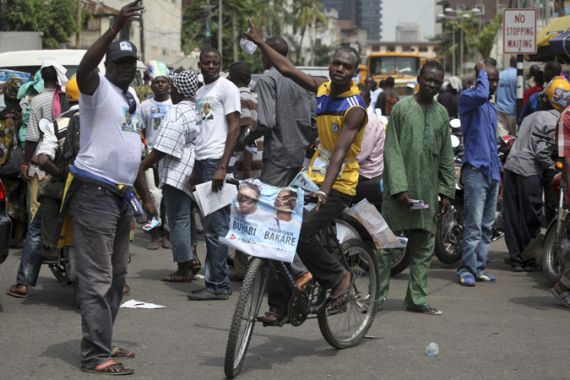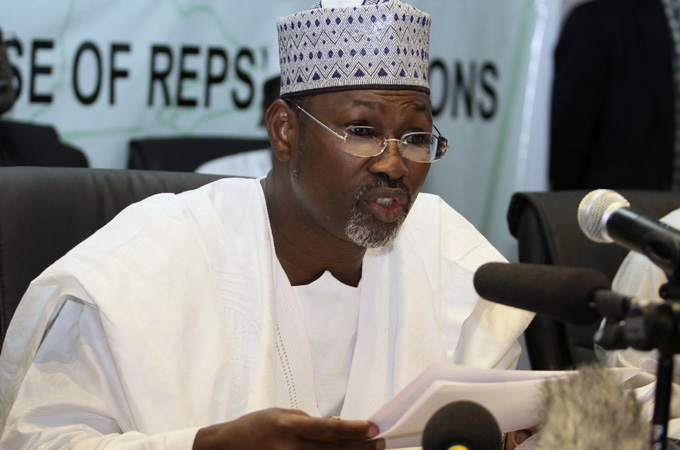Nigeria vote hit by fresh delays
Elections to go ahead in some areas but problems continue to hinder ballot considered a key test for Nigerian democracy.

 |
| Polls will go ahead in some areas but it is still unclear if Nigeria is ready to hold the elections [Reuters] |
Nigeria’s electoral agency have announced a third delay in legislative polls in certain parts of the country after it failed to sort out logistical problems in time for the weekend vote.
Attahiru Jega, the independent electoral commission chief, told reporters on Thursday that “the postponed elections affect only about 14 per cent of all senatorial districts and 13 per cent of federal constituencies.”
The National Assembly election, now set for Saturday, has already been postponed twice due to widespread organisational problems.
But Jega assured that elections would go ahead in areas that are not affected by the new delay.
“We are happy to say that elections will go ahead this weekend as planned… all is now set for the National Assembly elections to hold across the country on Saturday,” he stated.
Jega pulled the plug on the election last Saturday, after voting had started in some parts of the country.
The second delay also pushed back presidential and state polls that are due to follow.
Legislative balloting affected by the third delay will now be held on April 26 alongside polls for state governor and assemblies.
Saturday elections will not take place in some parts of 27 states of the federation, including the economic capital, Lagos.
US ‘disappointed’
The United States said on Thursday it is “disappointed” with a third delay in legislative elections.
“We share the disappointment of the electoral commission and the Nigerian people that this important electoral event had to be postponed,” Mark Toner, state department spokesman, said.
“And we renew our call for credible and transparent elections in this critically important country,” he added.
Jega said the latest delay arose because the commission was unable to have replacement ballot papers for those areas where voting had started last Saturday before he declared a postponement.
“It is not possible to print enough replacement ballot papers before the Saturday election,” said Jega, adding in some cases party names and logos were missing from ballot papers.
He said while his agency had taken “strenuous” steps to get the ballots printed on time, security requirements for the production of the papers and the inability of either local and foreign firms to deliver before Saturday, forced the delay.
“Consequently, while elections will in general take place next Saturday, it has become inevitable to postpone elections in a few affected constituencies – that is 15 senatorial districts… and 48 federal constituencies.”
Nigeria has 109 senators and 360 house of representative members.
Critical test
This month’s landmark polls are being viewed as a critical test of whether Africa’s largest oil producer, also the continent’s most populous nation, can organise a credible ballot after a history of election fraud and violence.
“What happened was unfortunate but it has happened… It is better to have a postponed election than to have a terribly flawed election,” he said.
Tremendous hope has been placed in the recently appointed Jega, a respected academic, who is under immense pressure to deliver improved polls in one of the world’s most corrupt countries.
Goodluck Jonathan, the president, who pre-election polls give a clean lead, appealed to voters not to be discouraged by the delays and urged them to return to the polling stations in their numbers for the rescheduled vote.
“Whether I am a candidate or not, I must conduct an election that would meet global minimum standards of transparency and fairness,” Jonathan said.
He said his country, a regional powerhouse, could not afford to fail in this election.
“Several countries in Africa have had successful elections, and if we don’t get it right, we can’t lead anybody or call anybody to order when they miss the mark,” he told a team of observers from the Washington-based National Democratic Institute (NDI).
Nigeria has taken a leading role in resolving crises in some West African, countries, including regional efforts to end the bloody post-election crisis in Cote d’Ivoire.